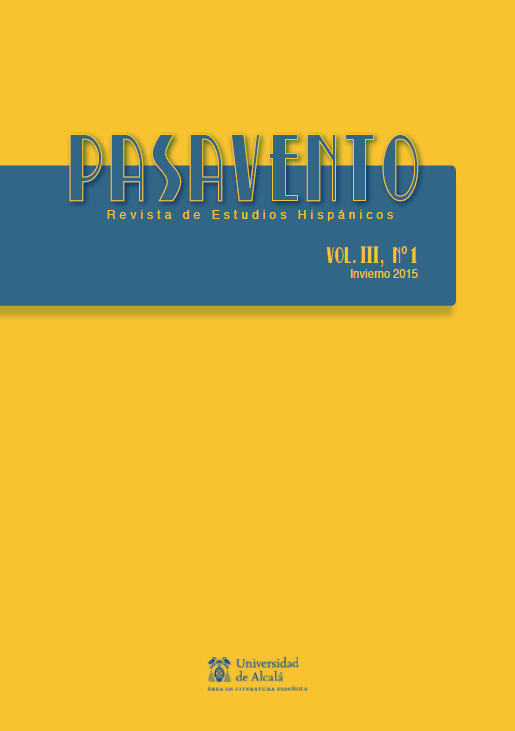The Deployment of Autofiction in Academia. Campus Novel in the Current Spanish Narrative
DOI:
https://doi.org/10.37536/preh.2015.3.1.969Keywords:
Autofiction, Campus Novel, Ego-Literature, Cercas, OrejudoAbstract
The article aims to analyze rhetorical devices derived from the convergence of two different genres of the contemporary Spanish novel: the campus novel and autofiction. Genres, in essence, are encodings which dictate the style, and in these novels, because of their very nature, the author might be tempted to cultivate solely the sphere that is most entertaining for the reader (or in interest of the literary market), through an epidermal, self-indulgent, and balmy prose. The defiance of these novels lies therefore in their ability to trangress the leaden narcissistic pleasure that can easily take over, and to make the most of the genre’s omnivorous and moldable character, both in terms of the rich mosaic of narrative techniques and the ability to offer an enchanting, new reading-experience. Building on these ideas, the article will analyze in detail two autofictional novels, which can be categorized as campus novels: La velocidad de la luz (2005) by Javier Cercas and the most recent, Un momento de descanso (2011) by Antonio Orejudo. The article will pay specific attention to a number of characteristics that these novels have in common, including the role played by autofiction and two further type of attributes that have been barely touched by the secondary literature: their ethical implications (which go far beyond the concept of intimate confession), and the evident continuity between the genre of autofiction and the interpretative categories of the readers.
References
Alberca, Manuel (2007): El pacto ambiguo. De la novela autobiográfica a la autoficción. Madrid, Biblioteca Nueva.
Amis, Kingsley (1954): Lucky Jim. Nueva York, Doubleday & Company.
Baudrillard, Jean (1981): Simulacres et simulation. París, Galilée.
Barthes, Roland (1953): Le degré zéro de l’ecriture. París, Seuil.
Belarbi, Mokhtar (2006): “Auto-alterbiographie dans Les Géorgiques et Le Jardin des Plantes de Claude Simon”, Texte, vol. 41-42, pp. 151-166.
Bértolo, Constantino (2009): La cena de los notables. Cáceres, Periférica.
Casas, Ana (2012): “El simulacro del yo: la autoficción en la narrativa actual”. En: Ana Casas (ed.): La autoficción. Reflexiones teóricas. Madrid, Arco Libros, pp. 9-45.
Cercas, Javier (1989): El Inquilino. Barcelona, Sirmio.
Cercas, Javier (2001): Soldados de Salamina. Barcelona, Tusquets.
Cercas, Javier (2005): La velocidad de la luz. Barcelona, Tusquets.
Certeau, Michel de (1990): L’invention du quotidien. París, Gallimard.
Chartier, Roger (2005): El presente del pasado. Escritura de la historia, historia de lo escrito. México, Universidad Iberoamericana.
Coetzee, J. M. (1999): Disgrace. Londres, Secker & Warburg.
Compagnon, Antoine (1991): Las cinco paradojas de la modernidad. Caracas, Monte Ávila Editores.
DeLillo, Don (1985): White Noise. Nueva York, Viking Press.
Doubrovsky, Serge (1977): Fils. París, Galilée.
Eugenides, Jeffrey (2011): The Marriage Plot. Nueva York, MacMillan.
Ferré, Juan Francisco (2009): Providence. Barcelona, Anagrama.
Foucault, Michel (1994): Hermenéutica del sujeto. Madrid, Las Ediciones de la Piqueta.
Foucault, Michel (2002): “La ética del cuidad de sí como práctica de libertad”. En: Carlos Gómez (ed.): Doce textos fundamentales de la Ética del siglo xx. Madrid, Alianza, pp. 256-265.
García Canclini, Néstor (2010): La sociedad sin relato. Antropología y estética de la inminencia. Buenos Aires, Katz Editores.
Gasparini, Philippe (2012): “La autonarración”. En: Ana Casas (ed.): La autoficción. Reflexiones teóricas. Madrid, Arco Libros, pp. 177-211.
Glissant, Edouard (1995): Introduction à une poétique du divers. París, Gallimard.
Harvey, David (1998): La condición de la posmodernidad. Buenos Aires, Amorrortu Editores.
Lodge, David (1984): Small World: An Academic Romance. Nueva York, MacMillan.
Louis, Annick (2010): “Sin pacto previo explícito: el caso de la autoficción”. En: Vera Toro, Sabine Schlickers y Ana Luengo (eds.): La obsesión del yo. La auto(r)ficción en la literatura española y latinoamericana. Madrid/Frankfurt, Iberoamericana/Vervuert, pp. 73-96.
Marías, Javier (1989): Todas las almas. Barcelona, Anagrama.
McCarthy, Mary (1951): The Groves of Academe. San Diego, Harcourt.
Roth, Philip (2000): The Human Stain. Nueva York, Knopf Doubleday
Orejudo, Antonio (1996): Fabulosas narraciones por historias. Madrid, Lengua de Trapo.
Orejudo, Antonio (2000): Ventajas de viajar en tren. Madrid, Alfaguara.
Orejudo, Antonio (2005): Reconstrucción. Barcelona, Tusquets.
Orejudo, Antonio (2011a): Un momento de descanso. Barcelona, Anagrama.
Orejudo, Antonio (2011b): “Al poder le gusta el humor, pero en una vitrina”, El País. Disponible en ˂http://elpais.com/diario/2011/03/05/babelia/1299287542_850215.html˃. Última consulta: 01.10.2014.
Showalter, Elaine (2005): Faculty Towers: The Academic Novel and its Discontents. Pennsylvania, Oxford University Press.
Sebald, W. G. (2002): Austerlitz. Barcelona, Anagrama.
Sontag, Susan (2007): Contra la interpretación y otros ensayos. Barcelona, Random House.
Vilain, Philippe (2005): Défence de Narcisse. París, Grasset.
Downloads
Published
How to Cite
Issue
Section
License
Copyright (c) 2015 Pasavento. Revista de Estudios Hispánicos

This work is licensed under a Creative Commons Attribution 4.0 International License.








